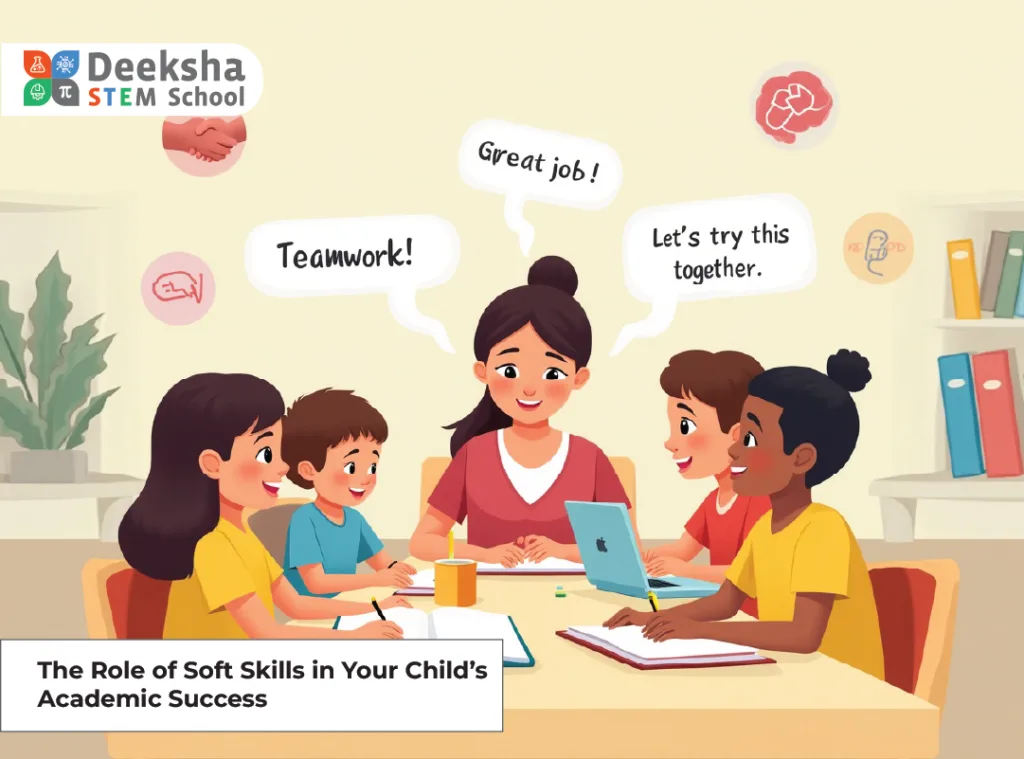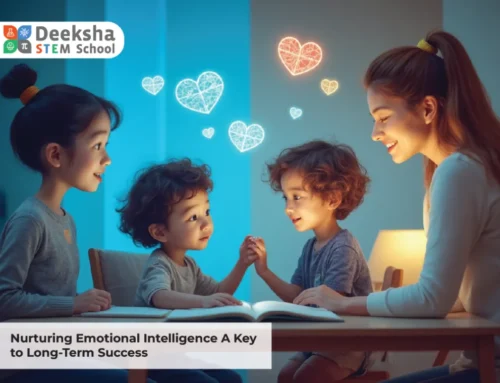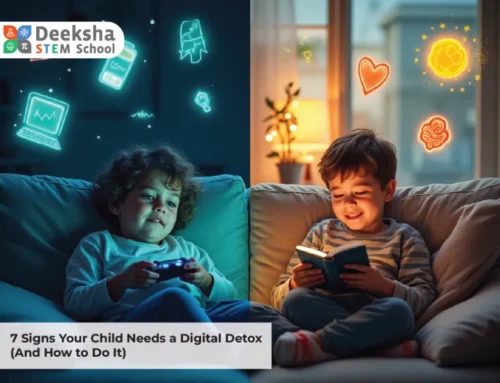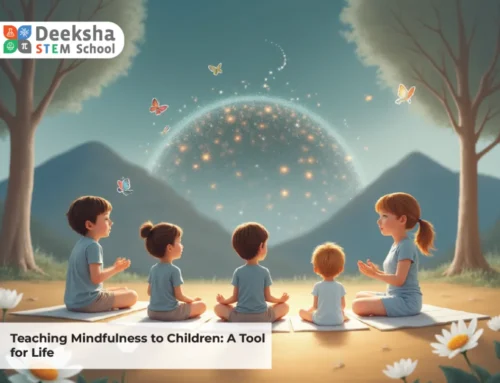Academic success is no longer just about memorizing facts or scoring high in exams. In today’s evolving educational landscape, a child’s ability to communicate effectively, work in teams, manage time, and adapt to challenges is just as important as subject knowledge. These are known as soft skills, and they are becoming essential not only for school success but also for lifelong learning, mental resilience, and career readiness.
At Deeksha STEM Schools, we believe that nurturing soft skills alongside academic learning empowers children to become confident, collaborative, and capable individuals who can thrive in dynamic, real-world environments.
Understanding What Soft Skills Really Mean
Difference Between Hard Skills and Soft Skills
Hard skills refer to academic or technical knowledge such as solving math problems, writing code, or understanding science concepts. These are measurable and typically taught through direct instruction and assessment-based evaluations.
Soft skills, on the other hand, are interpersonal and behavioral traits that determine how well a child interacts with others, handles pressure, resolves conflicts, and functions within a team or community. These include communication, empathy, time management, problem-solving, creativity, adaptability, and leadership.
Why Soft Skills Are Crucial for Students
Soft skills influence how a student learns, participates, and grows. A child who can ask questions confidently, collaborate with peers, and manage time effectively will likely perform better in school than one who lacks these traits, even if both have the same academic potential. These skills also foster resilience, reduce anxiety during assessments, and encourage initiative. They are critical in helping students become independent thinkers who are willing to take ownership of their learning.
Core Soft Skills That Drive Academic Growth
Communication and Listening
Effective communication helps students express their ideas clearly, ask questions, and engage in meaningful discussions. It is the backbone of collaborative learning. Listening actively is equally vital, as it allows students to understand instructions and absorb feedback. Classroom discussions, group projects, and even casual peer conversations all rely heavily on these core communication skills.
Critical Thinking and Problem-Solving
These skills help children analyze information, approach problems from multiple perspectives, and make reasoned decisions. Whether it’s solving a math equation, debating a social issue, or conducting a science experiment, critical thinkers are better equipped to tackle both predictable and unexpected challenges. This not only improves academic outcomes but also prepares them for real-world scenarios.
Time Management and Discipline
Managing time effectively is essential in helping students stay organized, meet deadlines, and maintain a balance between academic and personal activities. Building this skill early helps students avoid last-minute stress, enhances productivity, and builds a habit of planning. Discipline, as a complementary skill, reinforces consistency in study habits, attendance, and behavior.
Collaboration and Empathy
In team activities, students learn how to listen to others, appreciate different viewpoints, and share responsibilities. Empathy allows them to work with compassion and patience, building inclusive and respectful relationships. These experiences improve emotional intelligence, reduce conflicts, and make learning environments more supportive.
Emotional Intelligence and Adaptability
Understanding their own emotions and recognizing the emotions of others helps students respond calmly and rationally to high-pressure situations, such as examinations or peer disagreements. Adaptability enables them to cope with change—a crucial trait in today’s fast-evolving world where expectations and environments shift rapidly.
How Deeksha STEM Cultivates Soft Skills in Students
Project-Based Learning and Teamwork
At Deeksha STEM, project-based learning is integrated into the curriculum across grade levels. Students regularly work on interdisciplinary projects that require them to brainstorm, assign roles, work through disagreements, and present findings as a unified team. These experiences nurture negotiation, creative thinking, and leadership skills.
Role-Plays, Discussions, and Public Speaking
We encourage classroom environments where students engage in role-plays, presentations, group discussions, and debates. These activities take place across subjects like English, Social Science, and STEM, enabling students to articulate ideas, handle feedback, and overcome stage fear. Regular exposure to public speaking also builds self-esteem and clarity in thought.
Clubs, Exhibitions, and Cross-Grade Interaction
Students participate in various co-curricular clubs like literary clubs, eco clubs, debate forums, and science exhibitions. These platforms offer experiential learning beyond textbooks, allowing students to collaborate with peers of varying age groups. This diversity promotes adaptability, peer mentorship, and respect for different learning styles.
Mentorship and Student-Led Initiatives
Deeksha STEM actively promotes mentorship programs, where senior students help guide juniors in academics and co-curricular activities. We also give students the opportunity to lead school events, manage clubs, or represent their peers in student councils. These experiences cultivate accountability, initiative, and people-management skills early on.
The Link Between Soft Skills and Academic Performance
Improved Classroom Participation
Students who are articulate, confident, and empathetic are more likely to contribute meaningfully to class discussions, ask for clarification when needed, and help peers understand difficult concepts. This active participation enriches the classroom dynamic and boosts collective learning outcomes.
Better Exam Preparation and Stress Management
Students equipped with soft skills like self-discipline, time management, and emotional regulation are more likely to create realistic study schedules and follow them consistently. They are also better at handling exam-related stress and staying composed under pressure, which directly impacts academic performance.
Higher Engagement in Practical and Theoretical Learning
Soft skills fuel curiosity and engagement. A student with well-developed interpersonal skills is more likely to ask why and how, not just what. This makes learning deeper, more hands-on, and more relevant to real-life contexts. Active learners absorb and retain information more effectively.
Balanced Personality Development
Academic knowledge provides the what, but soft skills provide the how. Students who develop both are more confident, emotionally aware, and socially responsible. This balance creates well-rounded individuals who are prepared for both academic milestones and life challenges.
What Parents Can Do to Encourage Soft Skill Development
Model Respectful Communication at Home
Parents play a crucial role in shaping a child’s behavior. Speak to children with kindness and clarity. Include them in family discussions, value their opinions, and demonstrate listening without interruption. These small acts teach the power of respectful dialogue.
Give Children Space to Solve Their Own Problems
Resist the urge to intervene immediately when a problem arises. Encourage children to come up with possible solutions, weigh pros and cons, and implement decisions. This fosters independence and decision-making from an early age.
Encourage Journaling, Reading, and Reflection
Promote journaling as a tool to reflect on daily experiences, manage emotions, and improve self-awareness. Reading diverse genres of books builds vocabulary, comprehension, and empathy—core skills that enhance both academic and emotional intelligence.
Promote Group Activities and Peer Interaction
Enroll children in group-based extracurriculars such as team sports, theatre workshops, and volunteer initiatives. These help them understand group dynamics, develop patience, and improve conflict resolution skills.
Frequently Asked Questions
1. What are the top 3 soft skills every child should learn?
- Communication, empathy, and time management are foundational. These skills support effective learning, emotional balance, and meaningful relationships.
2. Can soft skills really improve grades?
- Yes. Students with strong soft skills are better at managing their schedules, understanding instructions, working with peers, and handling exam stress. These factors collectively contribute to improved academic results.
3. How does Deeksha STEM measure soft skill development?
- We use a combination of project evaluations, teacher observations, peer feedback, student self-assessments, and mentorship tracking to monitor growth in areas like leadership, collaboration, and communication.
4. At what age should soft skill training begin?
- Soft skills can be introduced as early as kindergarten through simple activities like storytelling, group play, and structured sharing. As children grow, more complex skills can be taught through projects, reflection, and structured feedback.
5. How do soft skills help with future careers?
- In every industry, employers look for team players, problem-solvers, and effective communicators. By developing these skills early, students enter higher education and careers with a strong foundation for success and adaptability.
Final Thoughts
At Deeksha STEM Schools, we believe that true academic success is a blend of strong knowledge and empowered character. Soft skills play a vital role in shaping students into lifelong learners, confident communicators, and future-ready leaders who not only excel in exams but thrive in life.
By prioritizing emotional intelligence, adaptability, collaboration, and effective communication, we prepare our students not just for board results but for challenges and opportunities beyond the classroom. Our focus on holistic education ensures that every child grows into a capable, compassionate, and confident individual.
Visit our campuses at Bannerghatta Road, Judicial Layout, Kengeri, and Vidyanagar to see how we’re cultivating soft skills alongside academic excellence.






Leave A Comment